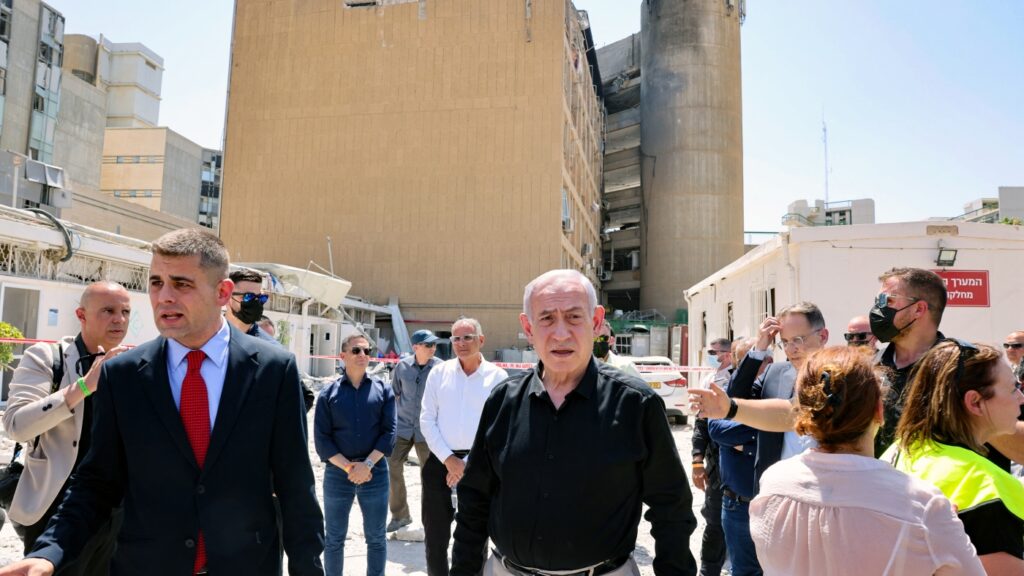
Israeli Prime Minister Benjamin Netanyahu visits the Soroka Hospital in the southern city of Beersheba, after it was hit by a missile fired from Iran on June 19, 2025. Israel's defence minister warned that Iran's supreme leader "can no longer be allowed to exist" after a hospital was hit in an Iranian missile strike on June 19, spiking tensions in the week-old war. (Photo by Marc Israel SELLEM / POOL / AFP) (Photo by MARC ISRAEL SELLEM/POOL/AFP via Getty Images)
JERUSALEM – In a series of decisive military operations, Israel has reasserted its dominance in the Middle East, altering the regional landscape just two years after a surprise attack caught the nation off guard.
Breaking: Ceasefire Marks Temporary Halt in Hostilities
The recent ceasefire between Israel and Iran, following 12 days of intense airstrikes, signals a temporary pause in the major conflicts that erupted after Hamas attacked Israel on October 7, 2023. However, the peace remains fragile as unresolved political disputes and a humanitarian crisis in Gaza continue to challenge Israel’s international standing.
Immediate Impact
Israel’s military campaign, targeting Iran and its proxies, has significantly weakened its adversaries. From the first airstrike on June 13, Israel’s air force dominated the skies, striking Iran’s nuclear sites and military facilities, and eliminating key leaders. Despite Iran’s Supreme Leader Ayatollah Ali Khamenei’s claims of victory, former U.S. President Donald Trump countered, asserting that Iran was “beaten to hell.”
“The Iranian camp is decimated and beaten to smithereens,” said Hussein Ibish from the Arab Gulf States Institute in Washington.
Key Details Emerge
Israel’s recent conflicts with Hamas in Gaza and Hezbollah in Lebanon have devastated these groups, both aligned with Iran. Additionally, the ouster of Syria’s dictator Bashar al-Assad, though not directly attributed to Israel, removed another regional rival.
Collapse of Iran’s Proxies
Iran had long invested in a network of proxies, known as the “axis of resistance,” to challenge Israel. However, the past two years have demonstrated Israel’s military superiority, supported by the U.S.
More than 56,000 Palestinians have been killed, most of them women and children, according to Palestinian health officials.
Expert Analysis
Despite military gains, Israel faces unresolved political challenges, particularly concerning the Palestinians. The ongoing conflict in Gaza, marked by high civilian casualties, underscores the complexity of achieving lasting peace.
“When the genocide case was first launched, I thought it was plainly hyperbolic,” said Hussein Ibish. “Now, obviously, it’s become a very serious case indeed.”
Regional Implications
Before the recent conflicts, Israel was making diplomatic progress with Arab nations, encouraged by the U.S. push for formal ties with Saudi Arabia. However, the Gaza conflict has stalled these efforts, with Saudi Arabia demanding progress on the Palestinian issue.
“Israel cannot move into the region, coexist with the region, build these normal relations, without solving this issue,” said Vali Nasr, an Iran expert at Johns Hopkins University.
What Comes Next
While Israel has reduced immediate security threats, its future in the region hinges on addressing political disputes. The U.S.-Israel alliance remains strong, as seen in recent U.S. airstrikes against Iran’s nuclear program.
Israel’s Prime Minister Benjamin Netanyahu, once politically vulnerable, has regained strength. His leadership during the conflict has bolstered his position, though the long-term implications of Israel’s military actions remain uncertain.
“The Israel that has come out of October 7th and the Gaza war is confident,” said Vali Nasr. “If it’s successful, then we will be dealing with a very different Middle East.”
The region’s future is uncertain, with potential for renewed conflict if political solutions remain elusive. Israel’s military prowess has reshaped the Middle East, but lasting peace will require diplomatic progress and resolution of longstanding issues.







